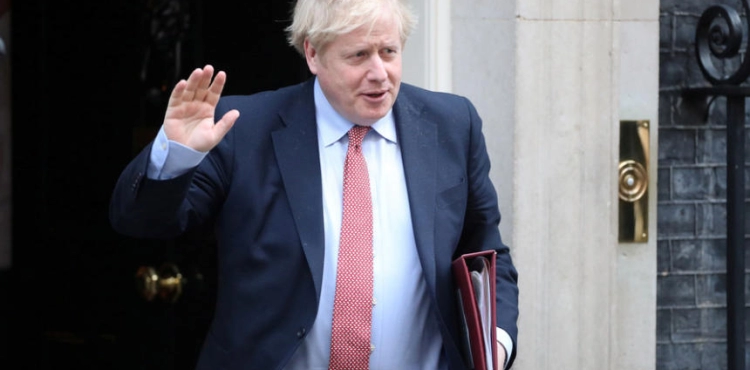British Prime Minister Boris Johnson, who recovered from the emerging coronavirus, is resuming his job at the head of the government on Monday under increasing pressure to unveil his plans for isolation applied more than a month ago.
Since his discharge from hospital on April 12, the 55-year-old conservative prime minister has been recovering in Checkers, the British Prime Minister´s rural residence, while his team has faced criticism for his management of a protracted crisis.
Foreign Minister Dominic Rapp, who declared himself absent during his absence, said Johnson was "in good shape" and "eager to resume work on Monday."
Sources at the British government headquarters confirmed on Saturday night to British media that Boris Johnson will return to his office on Monday and that he is "waiting impatiently" for that. The statements came to confirm what was published on Friday by the "Daily Telegraph" newspaper, which supports the conservative authority.
Several indications, such as the conservative Prime Minister´s phone call last week with US President Donald Trump and Queen Elizabeth II of Britain, suggested that he will return to work soon.
Trump said that Johnson "looked great (...) the Boris that we are entrusting ... enormous energy and enormous vitality."
British Health Minister Matt Hancock confirmed to Sky News Channel Friday that Johnson was "in very good shape."
At the hospital, Johnson was hospitalized for three days. He stressed that "things would have taken no turn." He praised the work of the British public health service (NHS), stressing that he "owes him his life."
Opposition leader Keir Starmer of the Labor Party renewed his criticism in a letter to Johnson, indicating that he was "looking forward" to discussing it.
In the opinion of the new leader of the Labor Party, Johnson made "mistakes" and the government was "very slow", whether in isolation, examination, or protective equipment that medical workers or the homes of the elderly alike lack.
More than a month ago, the British were invited to stay at home. From the high unemployment rate to the cessation of treatment for illnesses other than Covid-19 and the closure of schools, there are high hopes that Johnson will reveal his plans to try to run the economy and clarify the future of isolation imposed on March 23 and extended until May 7.
He was replaced by his government´s Foreign Minister, Dominic Rapp, who chaired a number of consecutive crisis meetings. But he needs the approval of the whole government, which newspapers say is divided, to make any major decisions.
The secretary of state shared the burden of the mission with Michael Goff, Johnson´s aide, and Matt Hancock during this period, which, according to the authorities, coincided with the height of the epidemic.
With more than 20,000 deaths in hospitals, Britain is among the worst affected countries in Europe. But the outcome will be greater after taking into account deaths in homes for the elderly and homes.
As for the repercussions of the epidemic on the economy, the Bank of England warned Thursday that the country may face the worst recession "in several centuries."
Public opinion supports isolation, but in Johnson´s absence, senior government officials faced increasing criticism. Starmer accused the authorities of being slow, whether in terms of isolation procedures, disease detection, or the provision of protective equipment that health care teams urgently need, as well as about the homes of the elderly.
The government has refused to date to set any date to ease the isolation measures, stressing that it fears an increase in the number of injuries and that it is awaiting the opinion of scientists.
The attendance of Johnson´s counselor, Dominic Cummings, and The Gadrian newspaper revealed a number of meetings of the scientific committee charged with clarifying the situation to the government, including the March 23 meeting, the date of the day on which the impeachment was imposed, cast doubt on the independence of this body.
The government presidency confirmed that political advisors "do not play any role" in the committee, criticizing by the way the media. But the Labor opposition considers this shakes the confidence of the British.
Scottish Prime Minister Nicolas Sturgeon added pressure to the announcement of its strategy to specifically reopen some businesses and schools.
In Northern Ireland, Prime Minister Arlen Foster has suggested that she may lift the restrictions before England does so.












